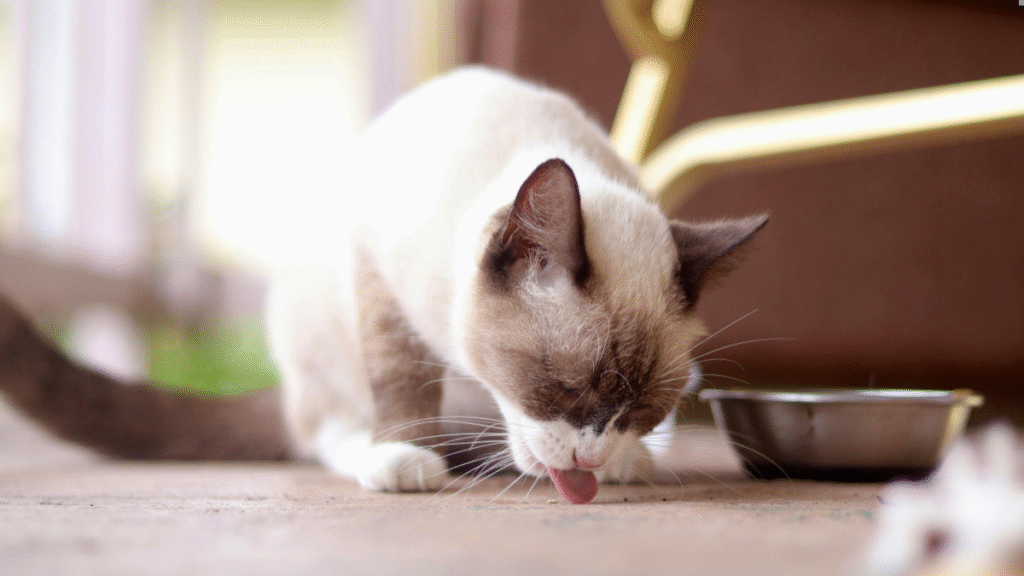Cats are curious creatures by nature. They explore everything with their paws, noses, and occasionally their tongues. A bit of curiosity is harmless, but some cat owners are troubled when their feline starts licking the floor in an odd and sometimes alarming manner.
We’ve all been there. As you walk into the kitchen, across the wooden floor, or into the bathroom, you notice your cat licking the floor for no apparent reason. As an owner, you’re puzzled by this behavior and concerned about how to stop your cat from licking the floor.
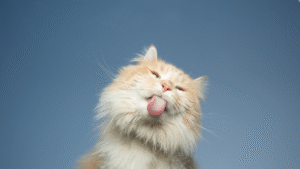
Why Do Cats Lick Floors?
Before jumping into solutions, it’s important to understand why cats lick floors in the first place. Identifying the cause will help you determine the best way to correct the behavior.
1. Nutritional Imbalance
If your cat’s diet is low in essential vitamins, minerals, or nutrients—particularly salt or trace minerals—it may try to obtain them by licking various surfaces.
Solution:
Check the food label to ensure your cat is receiving a nutritionally complete, high-quality diet. Cats require high levels of protein and taurine, and their food should be balanced with adequate vitamins and minerals. Consider switching to a premium cat food or adding supplements after consulting your veterinarian.
2. Leftover Smells and Spills
Kitchen and dining room floors often collect crumbs, spills, or food residue. Even if you’ve cleaned thoroughly, your cat’s sensitive nose can still detect lingering scents and flavors, tempting it to lick the floor.
Solution:
Keep the floors spotless. Use a pet-safe cleaner and mop thoroughly to remove residual smells. Avoid leaving food debris or crumbs on the floor.
3. Boredom or Attention-Seeking Behavior
Cats that don’t receive enough playtime or stimulation may develop odd habits, such as licking floors or walls. This can be a way of relieving boredom or seeking attention.
Solution:
Increase your cat’s daily activity and mental stimulation. Provide interactive toys, puzzle feeders, and cat trees for climbing and scratching. Schedule at least two interactive play sessions each day, lasting 15–20 minutes, to help your cat expend energy and stay mentally sharp.
4. Stress or Anxiety
Cats are sensitive animals and can develop compulsive behaviors when stressed or anxious. The loss of a companion animal, a move to a new home, the addition of a new pet, or changes in routine can all trigger stress-related behaviors such as excessive licking.
Solution:
Identify and minimize the source of stress whenever possible. Try using pheromone diffusers or calming sprays in the areas your cat licks. Maintain a consistent routine for feeding, play, and bedtime to promote a sense of security. Create a quiet, cozy zone with soft bedding where your cat can retreat and feel safe.
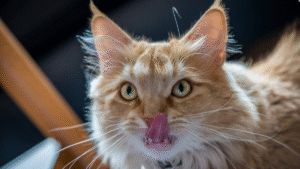
5. Pica Disorder
Persistent licking or chewing of non-food items such as fabric, plastic, carpet, or wood may indicate pica, a behavioral disorder. Pica can be caused by nutritional deficiencies, stress, or even genetic factors. Certain breeds, such as Siamese and Burmese cats, are more prone to developing this condition.
Solution:
Schedule a veterinary visit to rule out underlying issues such as anemia, thyroid problems, or gastrointestinal disturbances. Your vet may recommend medication, dietary changes, or behavior therapy, depending on the diagnosis.
6. Health Conditions
Some medical issues can cause cats to develop unusual licking habits. Common examples include dental disease, nausea, or toxin ingestion. Cats experiencing nausea may also lick cool surfaces, such as tiles, to soothe discomfort.
Solution:
If your cat suddenly starts licking the floor frequently or shows other symptoms—such as vomiting, drooling, loss of appetite, or behavior changes—schedule a veterinary checkup immediately. It’s always best to rule out medical causes before assuming the issue is behavioral.
The Dangers of Cats Licking Floors
While licking may seem harmless, it poses several health risks for cats.
1. Toxic Cleaning Chemicals
Many household cleaners contain bleach, ammonia, or polish compounds that are toxic to cats. Even small amounts can cause poisoning if ingested.
2. Bacteria and Germs
Floors harbor bacteria and germs from shoes, food, and general foot traffic. Your cat could ingest harmful pathogens or parasites through licking.
3. Choking or Intestinal Blockages
Licking and ingesting hair, dirt, or debris can lead to choking or intestinal blockages, which may require emergency veterinary care.
4. Behavioral Reinforcement
Allowing your cat to continue licking reinforces the behavior, making it more difficult to stop over time.
How to Stop Cats from Licking the Floor
Now that we understand the causes and dangers, let’s look at the best ways to stop your cat from licking the floor.
1. Rule Out Health Issues First
Before making any changes to your cat’s environment or diet, visit your veterinarian to rule out medical conditions such as pica, thyroid disorders, or dental disease. Addressing underlying health issues is the first and most important step.
2. Improve Your Cat’s Diet
If a nutritional deficiency is suspected, switch to a balanced, high-protein diet.
-
Choose a cat food that meets AAFCO standards for nutritional adequacy.
-
Incorporate wet food to increase hydration and support digestion.
-
Consider supplements such as omega-3 fatty acids and probiotics after consulting your vet.
A nutritionally balanced diet can greatly reduce the urge to lick non-food items.
Related:How To Switch To Natural Cat Food
3. Provide Stimulation and Environmental Enrichment
Mental and physical stimulation help prevent boredom-related behaviors.
Try the following:
-
Rotate toys to maintain your cat’s interest.
-
Add cat trees, shelves, and scratching posts.
-
Use puzzle feeders to mimic hunting instincts.
-
Play interactive games with feather wands or laser toys twice daily.
Enrichment not only stops floor licking but also improves overall feline well-being.
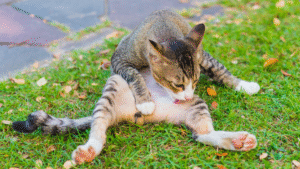
4. Use Safe Deterrents
To discourage your cat from licking specific areas:
-
Spray pet-safe deterrents such as bitter apple or citrus-based sprays.
-
Place double-sided tape where your cat licks—most cats dislike the sticky texture.
-
Temporarily cover the area with a rug or mat to block access.
Always ensure any deterrent used is non-toxic and safe for pets.
5. Keep Floors Clean
A spotless floor is less tempting for cats to lick.
-
Use unscented, pet-safe cleaners.
-
Avoid bleach or ammonia-based products.
-
Wipe spills immediately and rinse floors thoroughly after cleaning.
Tip: A 50/50 vinegar and water solution works as a safe, natural cleaner that also helps eliminate odors.
6. Address Stress and Anxiety
If stress is the underlying cause, focus on creating a calm and stable environment.
-
Use pheromone diffusers or calming sprays.
-
Provide a quiet area with comfortable bedding.
-
Maintain a predictable daily routine.
-
If needed, consult your vet about anti-anxiety medications or natural calming supplements.
7. Reward and Use Positive Reinforcement
Reward your cat for good behavior. Redirect it from floor licking to a toy or treat.
Avoid yelling or punishing your cat—it can increase stress and worsen the problem. Instead, encourage positive behavior through gentle redirection and rewards.
When to Call the Vet
If your cat’s licking behavior continues despite your efforts—or if you notice any of the following—consult your veterinarian:
-
Persistent or obsessive licking
-
Lethargy or decreased appetite
-
Vomiting or diarrhea
-
Drooling or pawing at the mouth
-
Sudden behavioral changes
Your vet can perform bloodwork, check for parasites, and recommend appropriate treatment or behavior modification techniques.
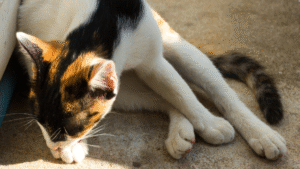
Preventing Future Licking Behavior
Once you’ve resolved the issue, take these preventive measures to stop it from returning:
-
Clean floors regularly using only pet-safe cleaning products.
-
Ensure your cat gets daily exercise and mental stimulation.
-
Feed a nutritionally balanced diet and monitor eating habits.
-
Schedule annual veterinary checkups to catch potential health problems early.
-
Keep your cat’s environment calm and minimize sudden changes in routine.
Final Thoughts
While occasional floor licking may seem harmless, frequent or obsessive licking can signal an underlying problem. The behavior could stem from boredom, stress, or nutritional deficiencies. The key to stopping it is identifying and addressing the root cause.
By offering a balanced diet, an engaging environment, pet-safe deterrents, and a clean home, you can help your cat overcome this behavior. Always consult your veterinarian to rule out medical issues and ensure your cat remains healthy and happy.
With patience and care, your feline friend will soon forget about licking the floor and return to more typical—and endearing—cat behaviors like chasing shadows, basking in the sun, and curling up beside you.
Save pin for later
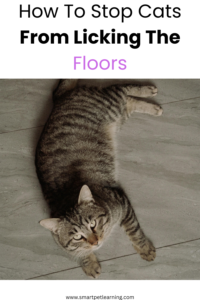
- Why Cats Avoid Eye Contact - January 31, 2026
- How to Stop Cats From Climbing Where They Shouldn’t - January 31, 2026
- Why Dogs Get Hyper at Night - January 31, 2026
